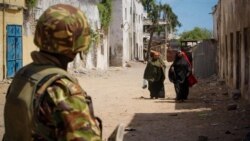Twenty-two years ago, as Somalia plunged into political chaos and civil war, the United Nations Security Council moved to cut off the flow of weapons that were helping fuel the fighting by imposing a strict arms embargo on the Horn of Africa nation.
Last year, as the nation’s first president since the fall of the last government in 1991 took office, Somalia faced another threat to peace and stability in the continued presence of al-Shabaab insurgents bent on toppling the new government and imposing a strict interpretation of Islamic law.
Somali leaders say the arms embargo is hampering their ability to confront the threat. On March 6, the UN Security Council voted unanimously to suspend the embargo on the Government of Somalia.
With the arms embargo now eased for one year, Somali officials say they will be able to rebuild the country’s military forces and consolidate recent gains made against al-Shaabab. Working with African Union troops from Uganda, Burundi, Kenya and Djibouti, Somali forces drove the militants out of the capital, Mogadishu, and other areas in central and southern Somalia that they had held. With the recent UN Security Council vote, the mandate of the African Union force, known as AMISOM, was also extended until February 2014.
The United States has worked closely with the Somali people during the political transition and supports lifting the embargo at least temporarily for the Somali government. The restrictions have been in place for decades and new realities on the ground in Somalia call out for modifications for at least one year. We insist, however, on maintaining the current embargo on non-state actors, al-Shabaab, and other sanctioned individuals and entities.
Last year, as the nation’s first president since the fall of the last government in 1991 took office, Somalia faced another threat to peace and stability in the continued presence of al-Shabaab insurgents bent on toppling the new government and imposing a strict interpretation of Islamic law.
Somali leaders say the arms embargo is hampering their ability to confront the threat. On March 6, the UN Security Council voted unanimously to suspend the embargo on the Government of Somalia.
With the arms embargo now eased for one year, Somali officials say they will be able to rebuild the country’s military forces and consolidate recent gains made against al-Shaabab. Working with African Union troops from Uganda, Burundi, Kenya and Djibouti, Somali forces drove the militants out of the capital, Mogadishu, and other areas in central and southern Somalia that they had held. With the recent UN Security Council vote, the mandate of the African Union force, known as AMISOM, was also extended until February 2014.
The United States has worked closely with the Somali people during the political transition and supports lifting the embargo at least temporarily for the Somali government. The restrictions have been in place for decades and new realities on the ground in Somalia call out for modifications for at least one year. We insist, however, on maintaining the current embargo on non-state actors, al-Shabaab, and other sanctioned individuals and entities.






